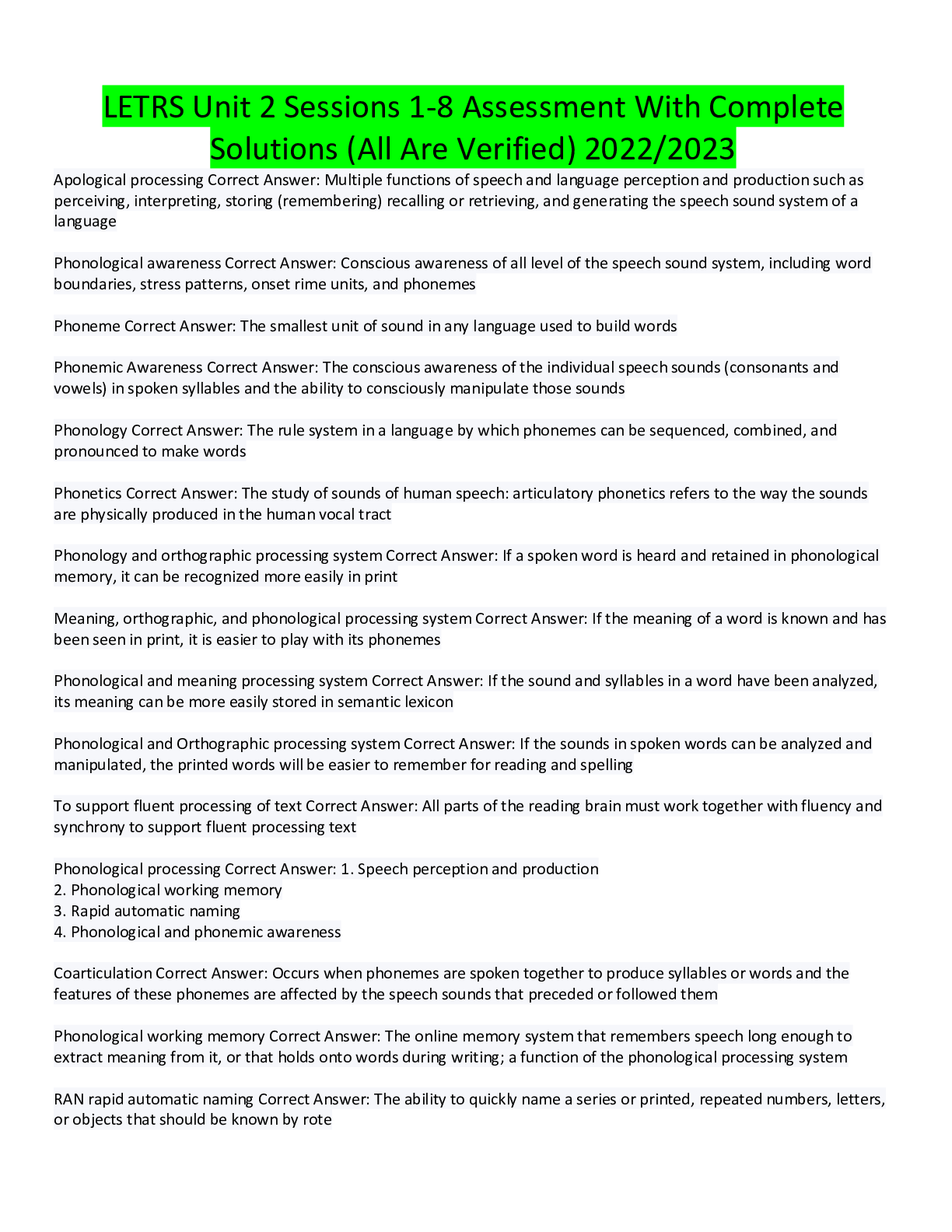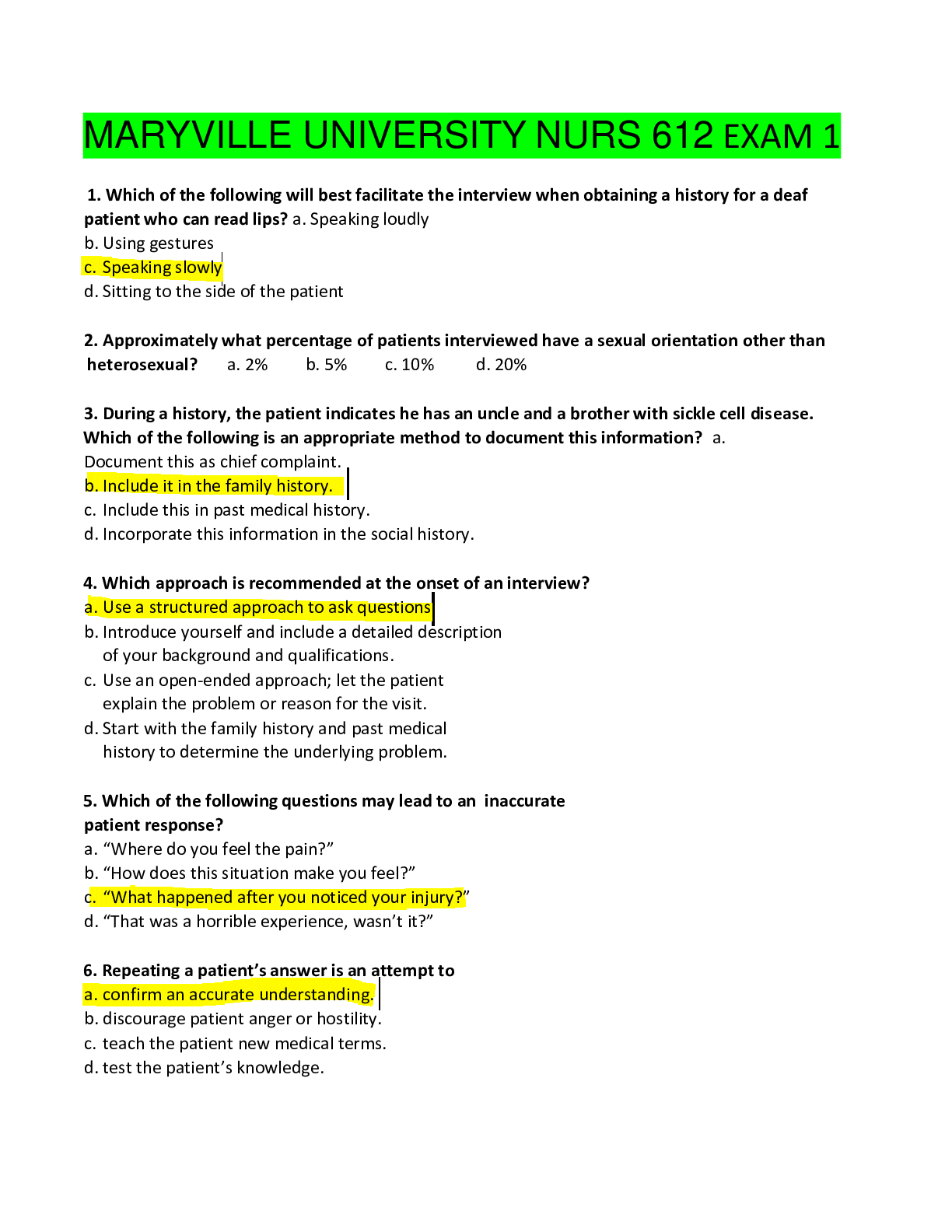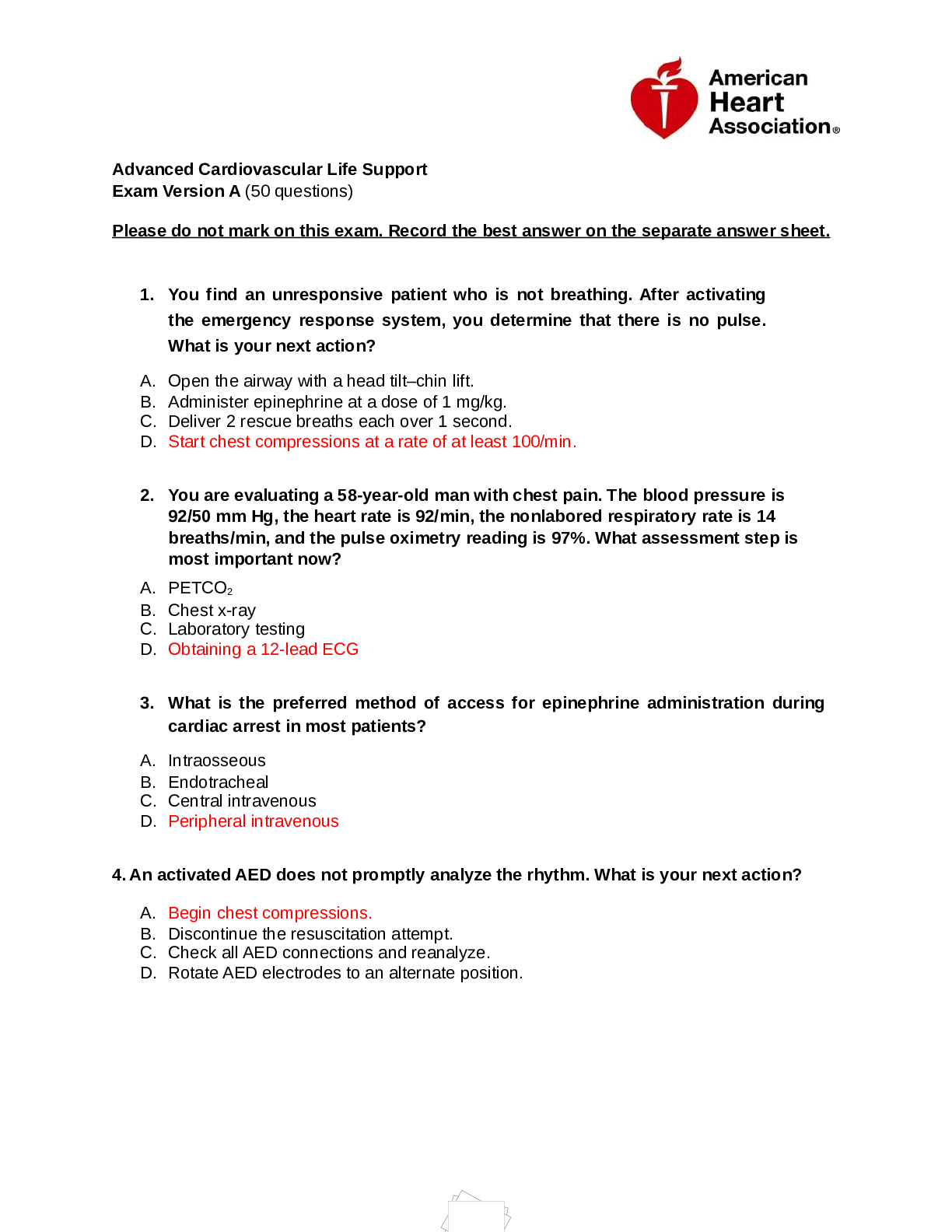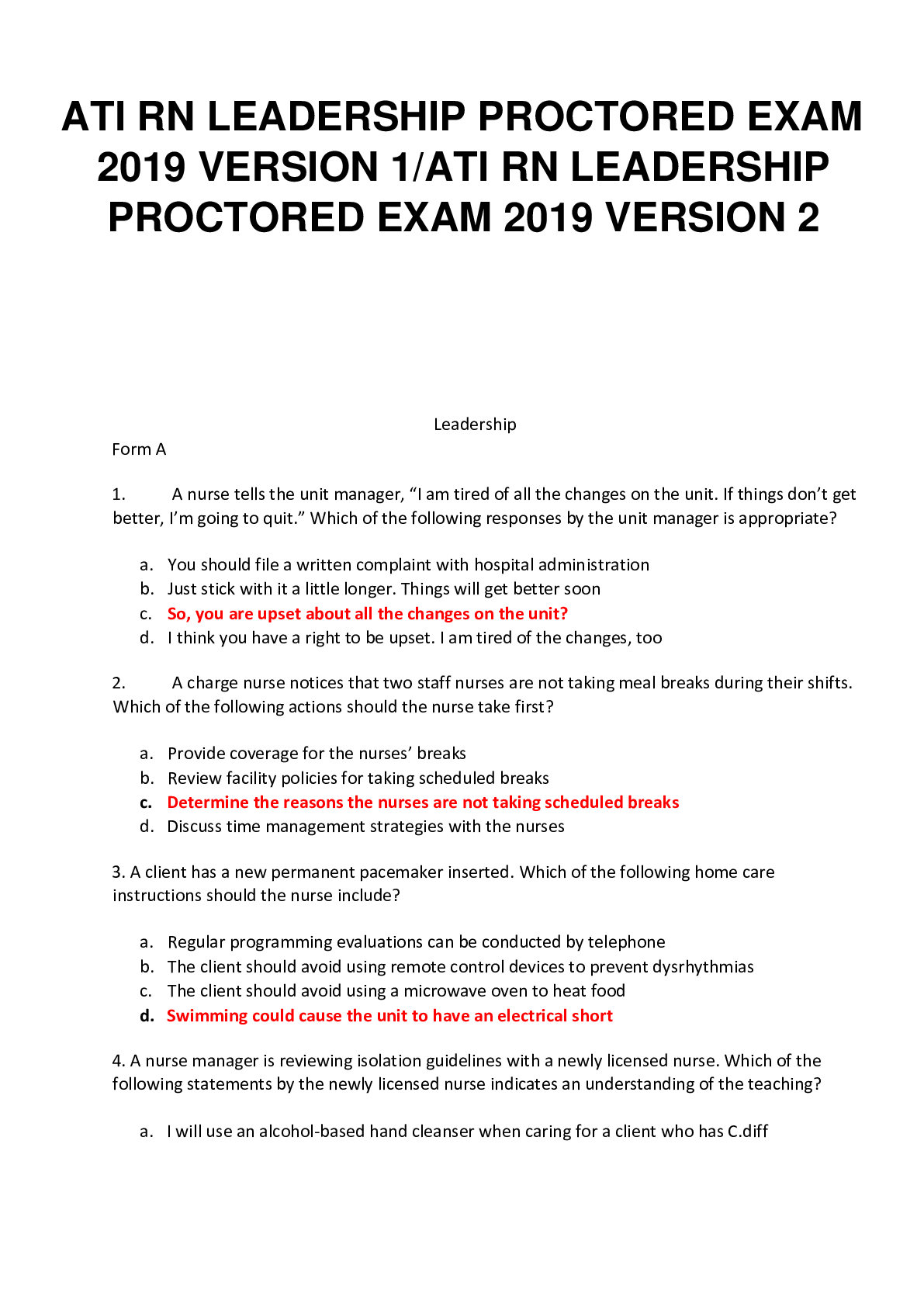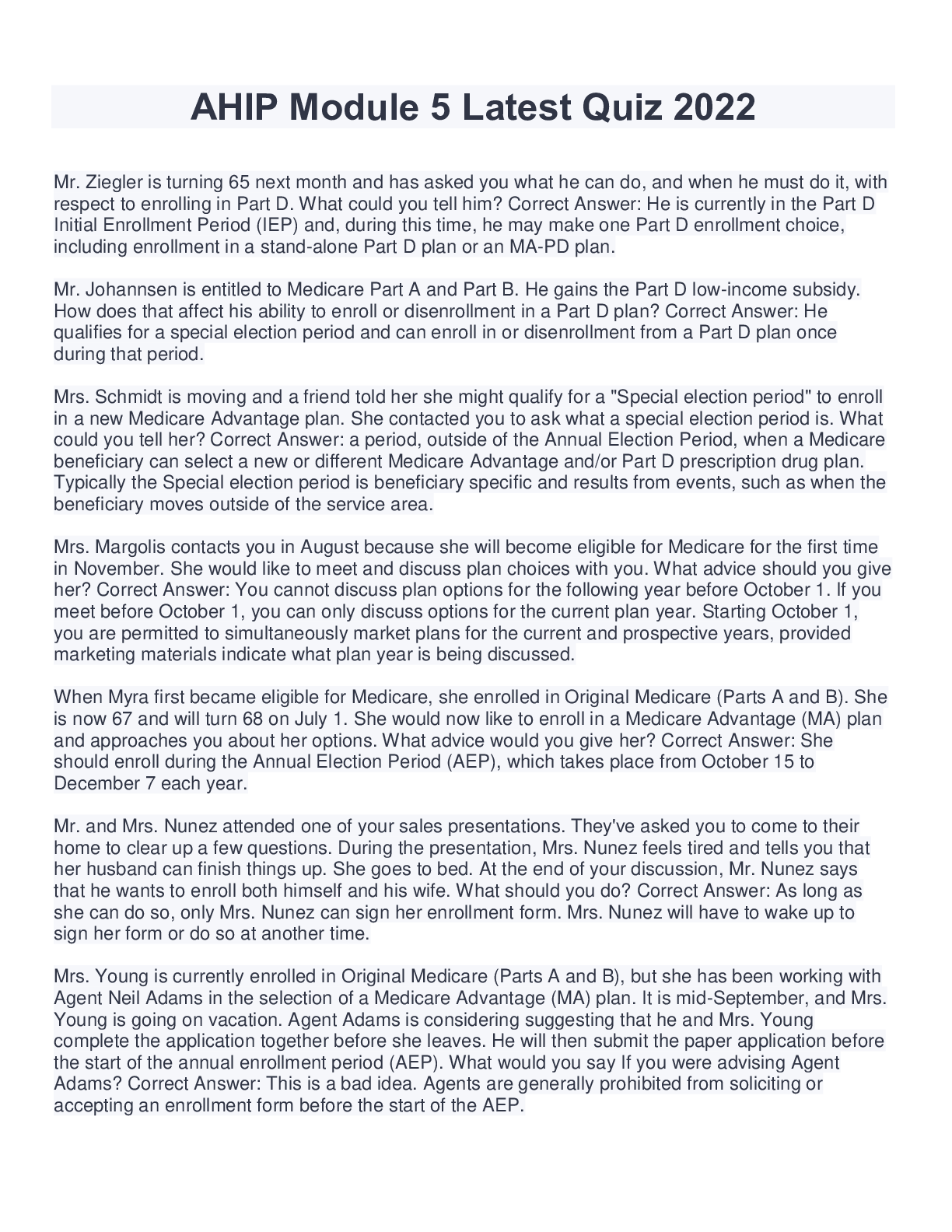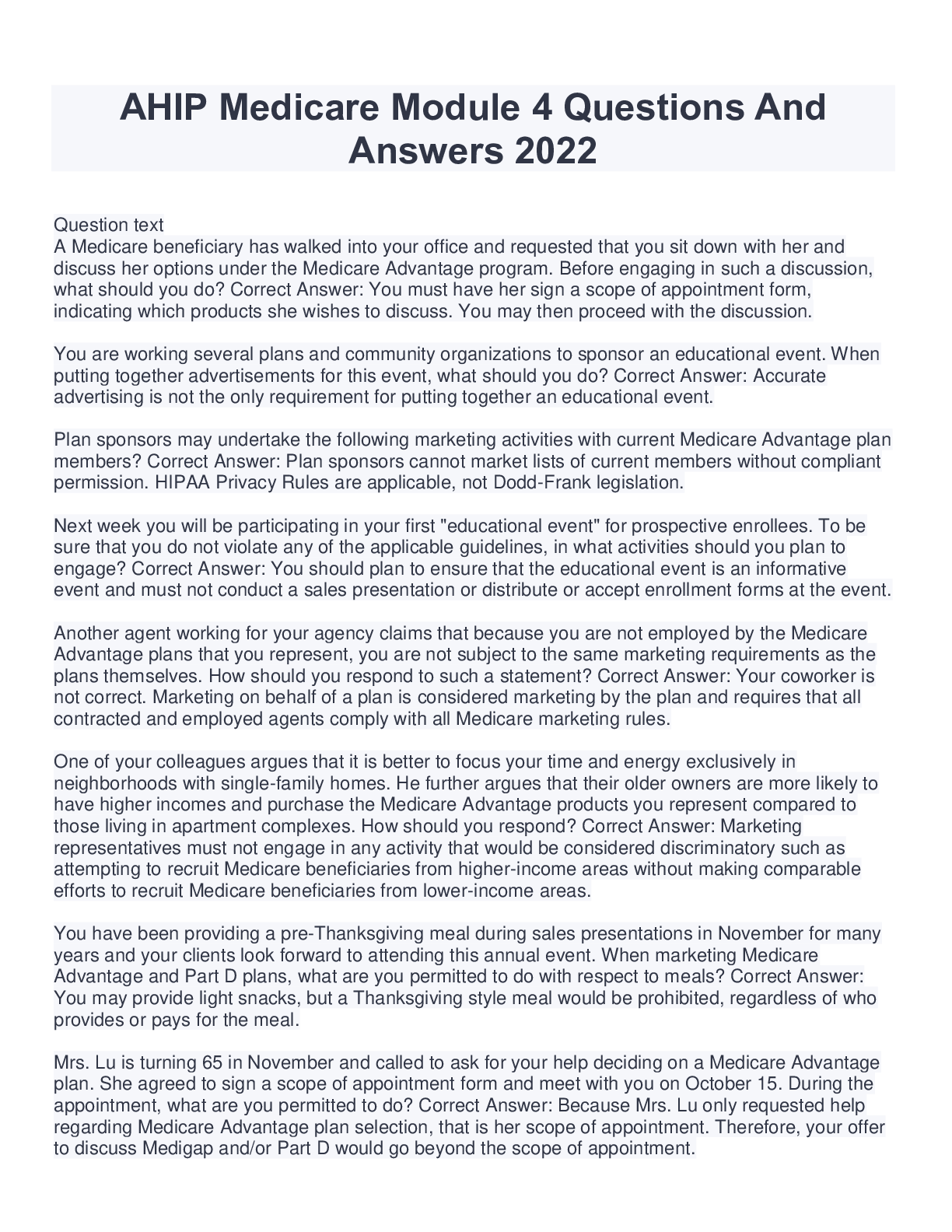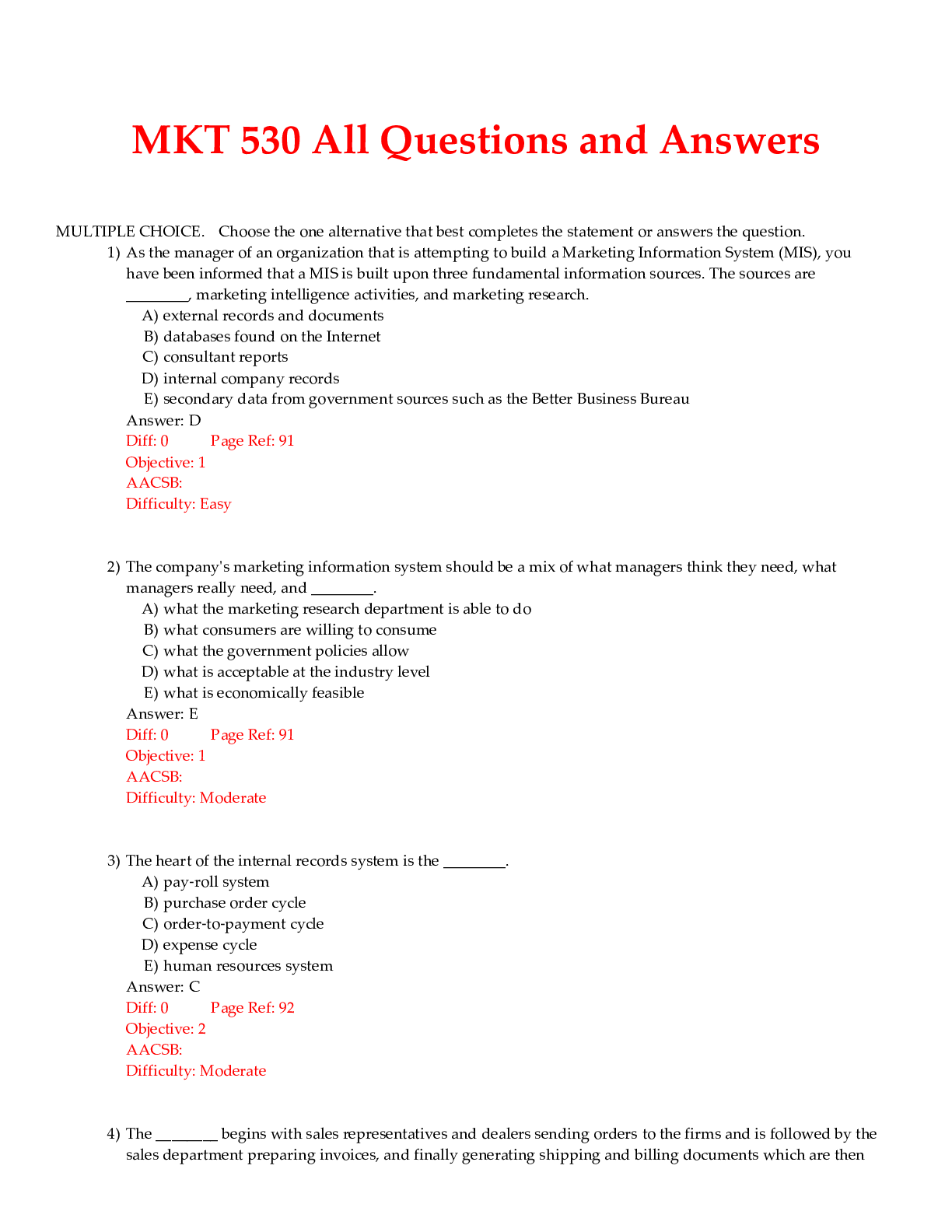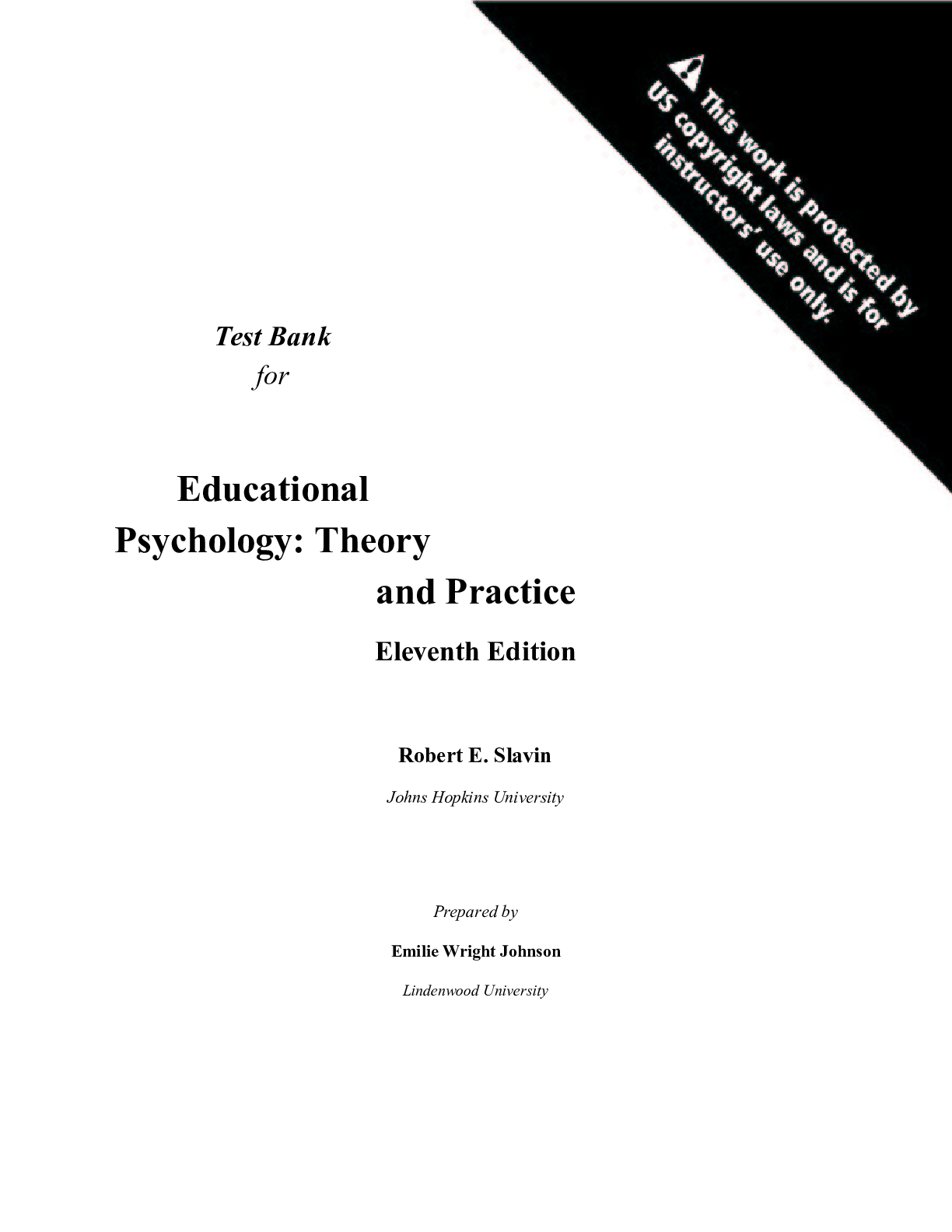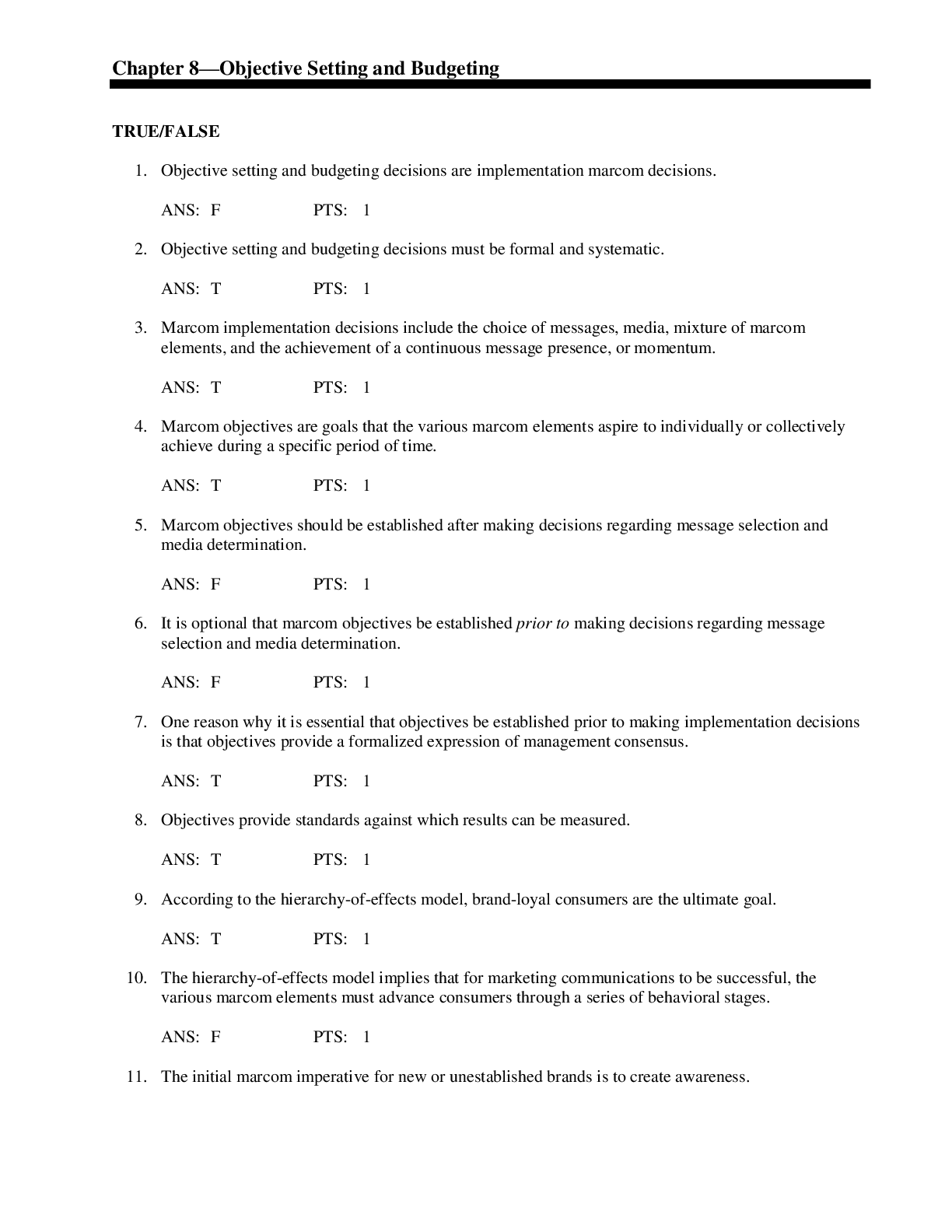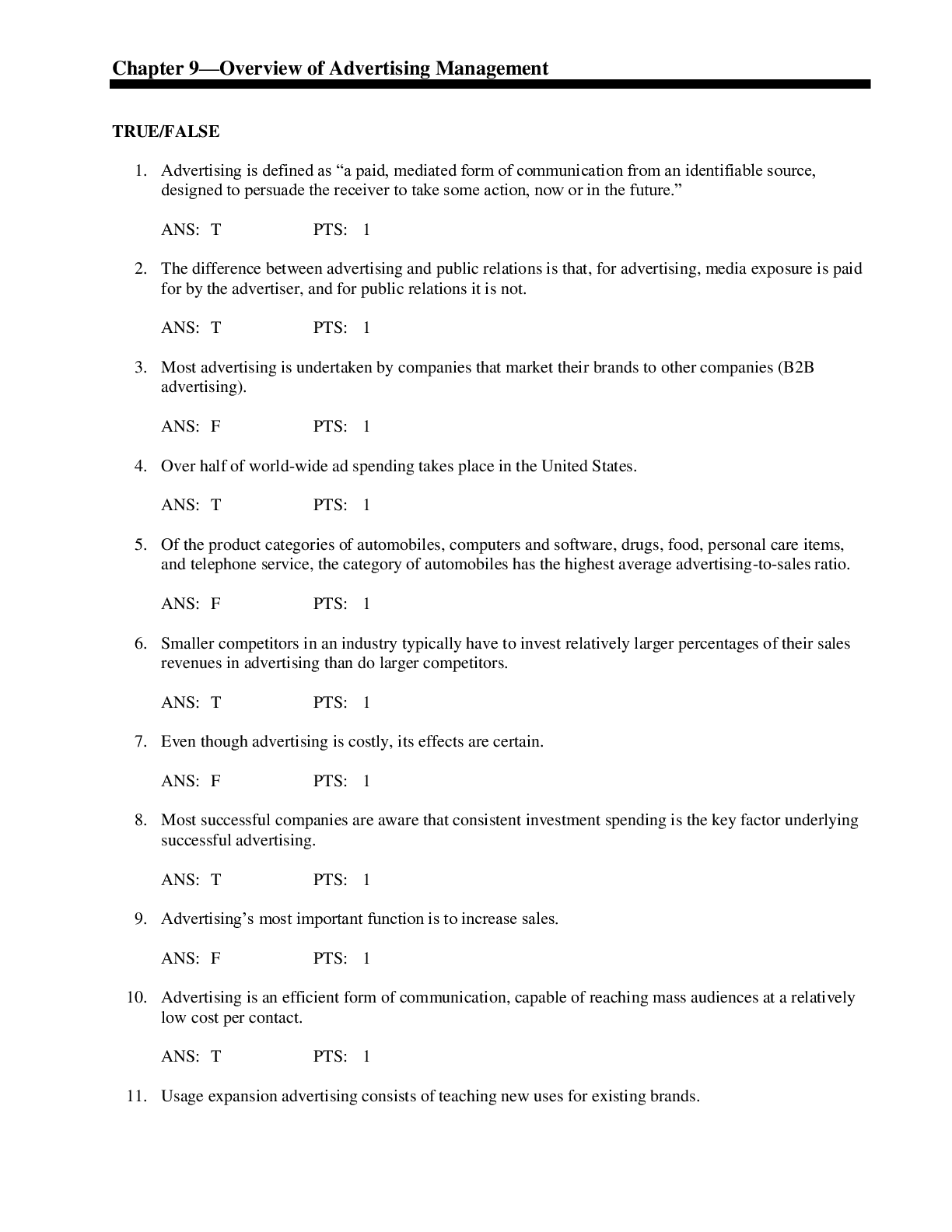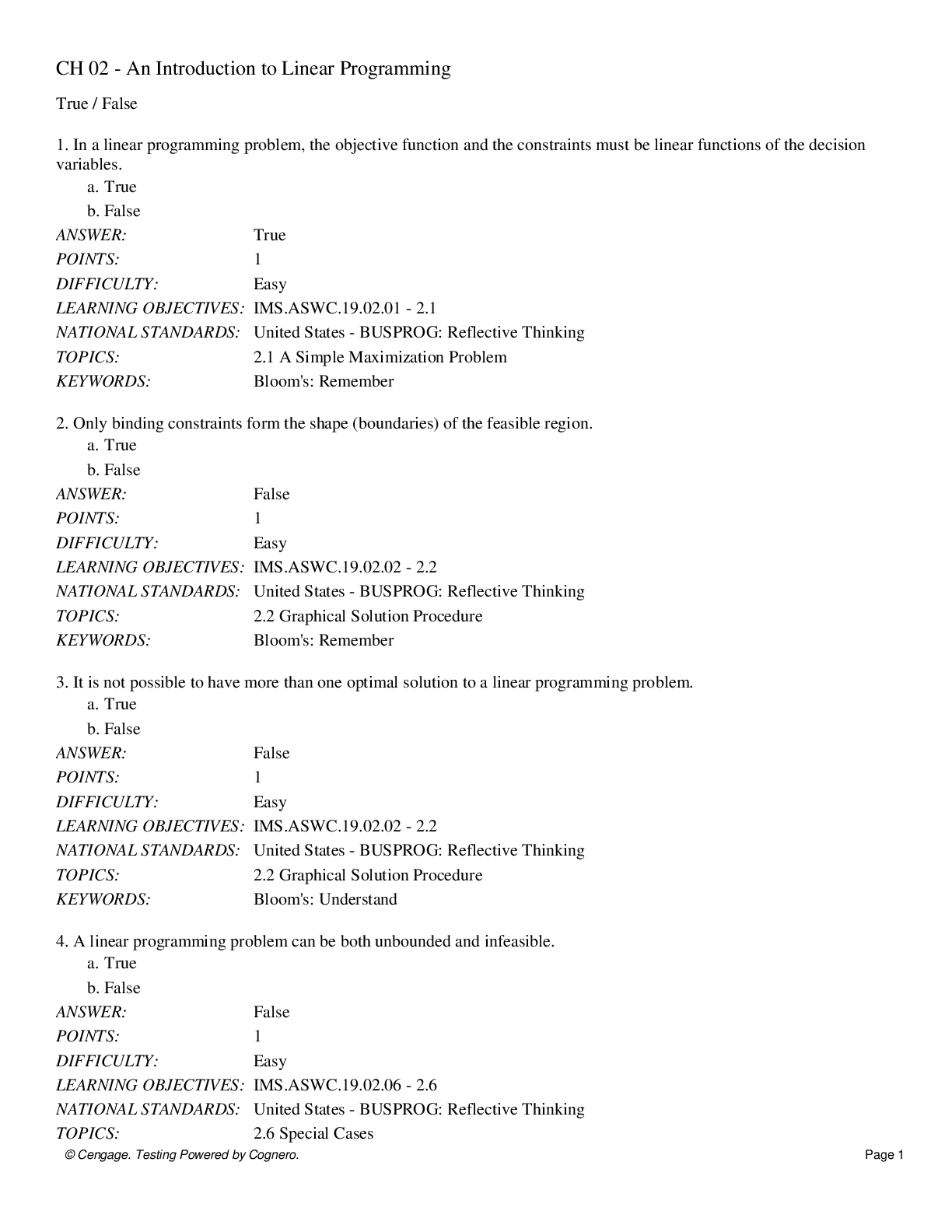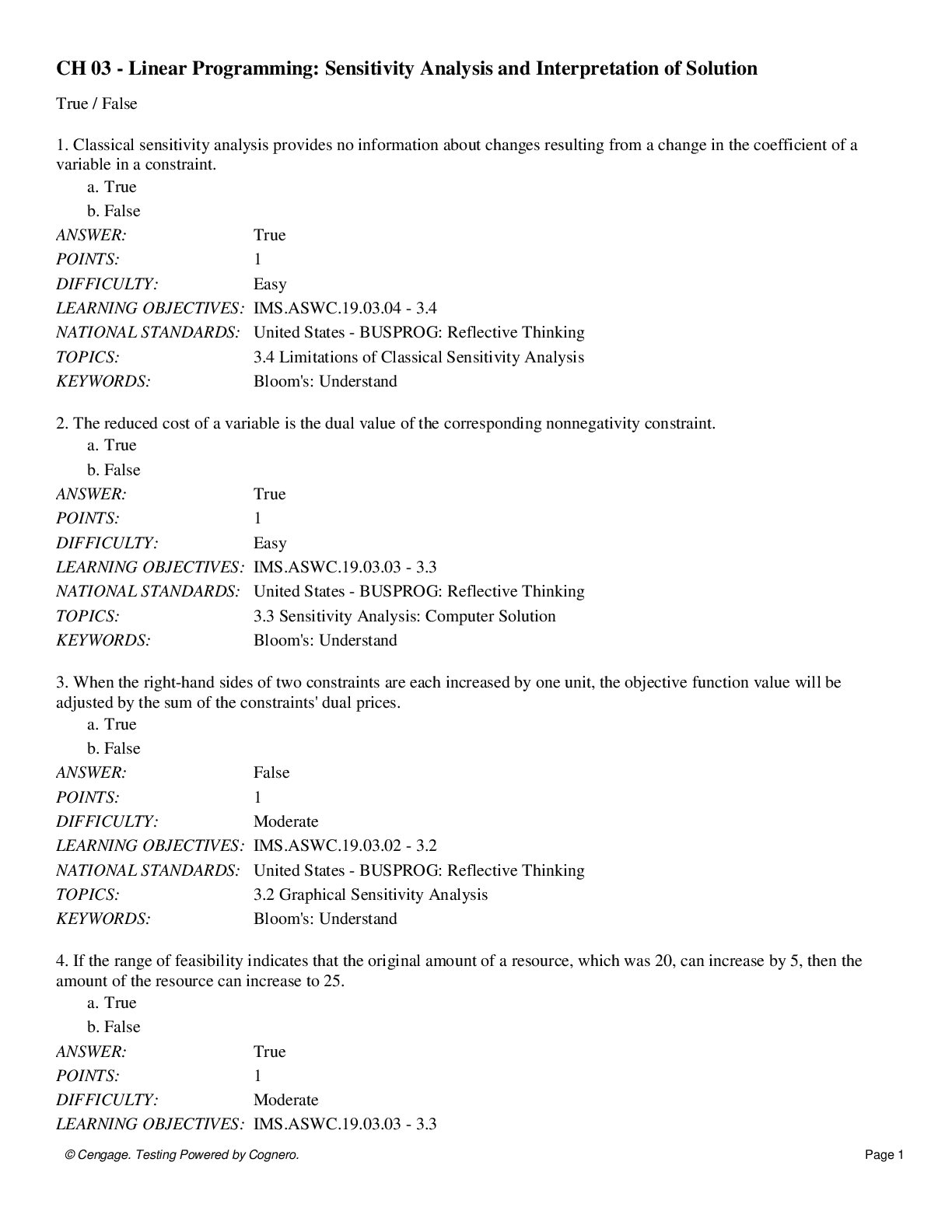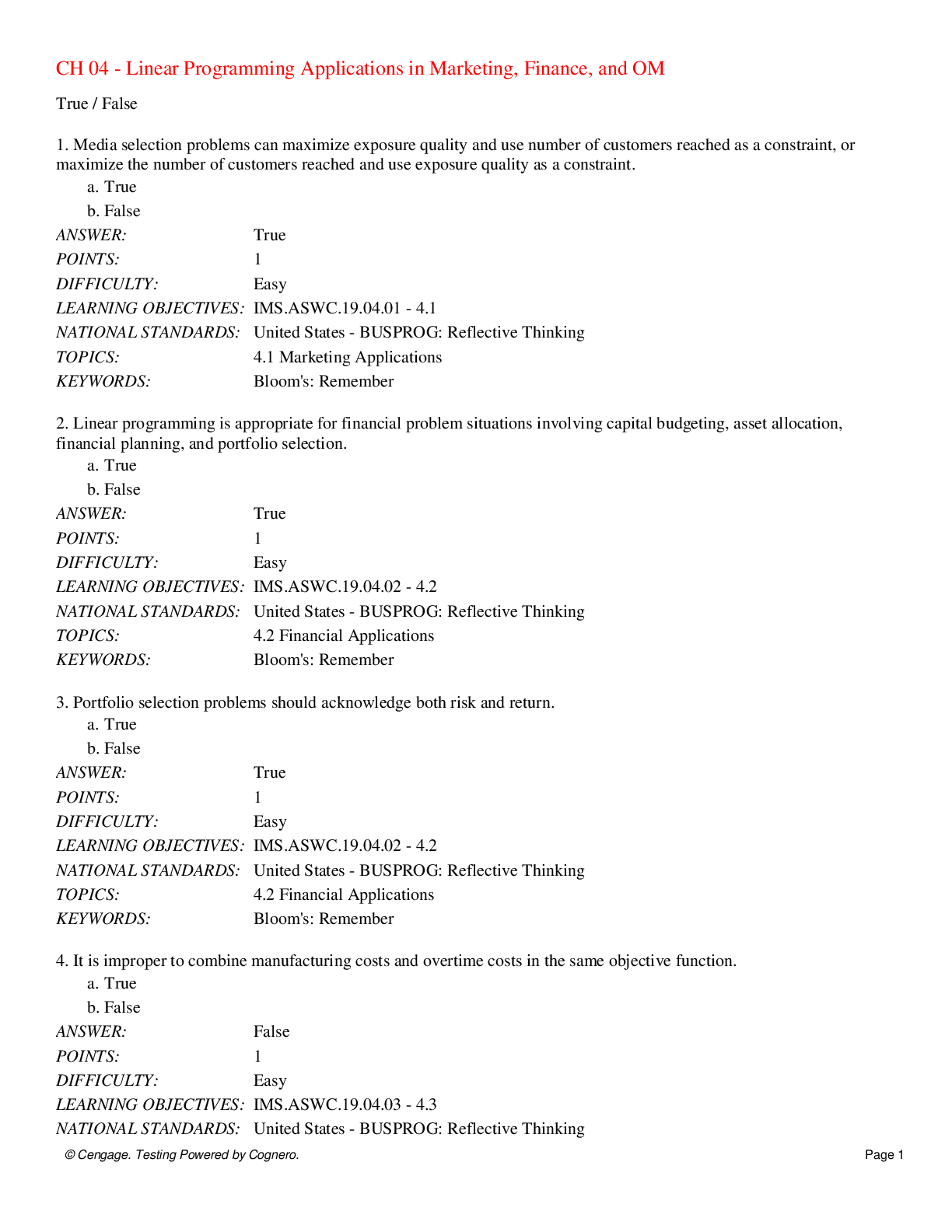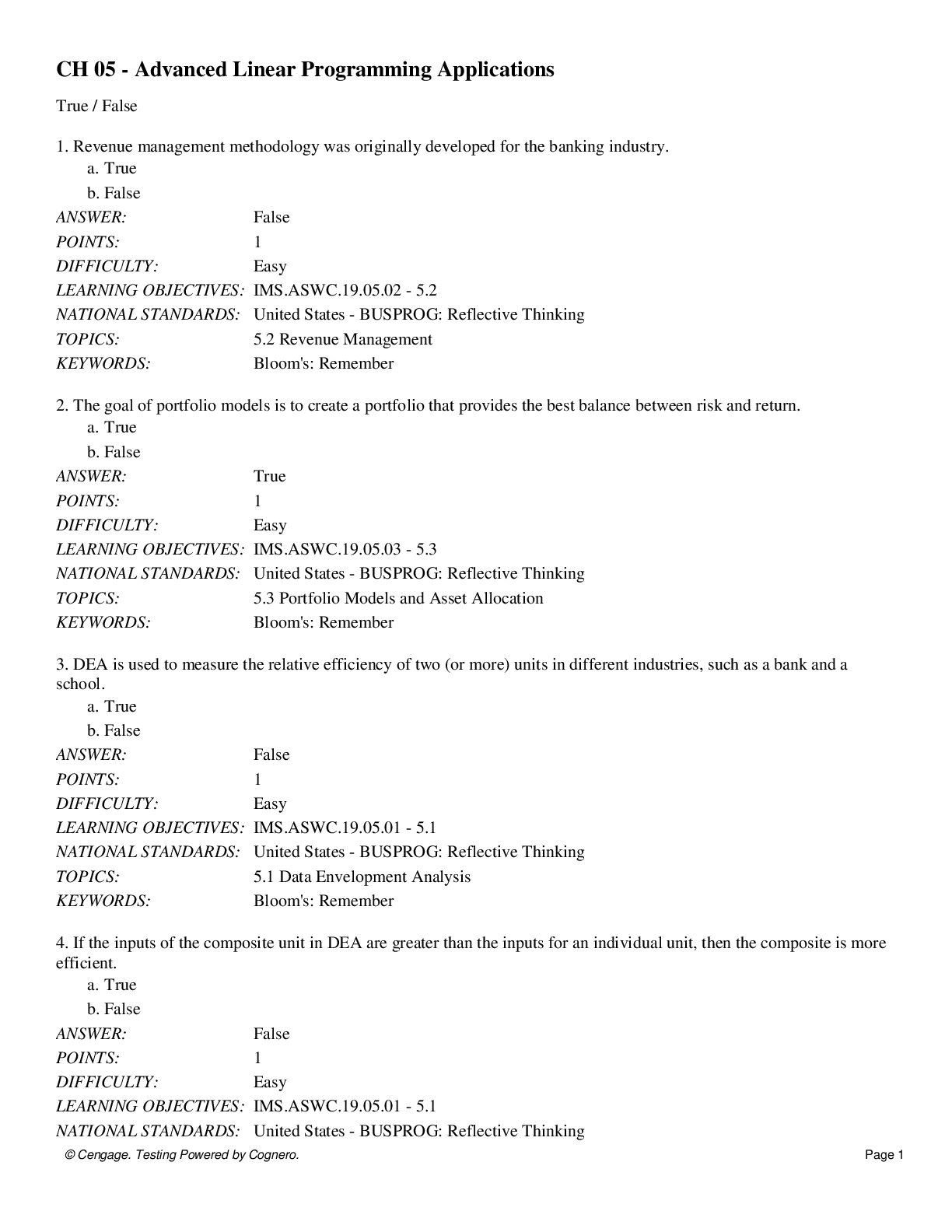Physiology > QUESTIONS & ANSWERS > PSYCH PYC2603 ASSIGNMENT 01 – SEMESTER 2 QUESTIONS AND ANSWERS GRADED A (All)
PSYCH PYC2603 ASSIGNMENT 01 – SEMESTER 2 QUESTIONS AND ANSWERS GRADED A
Document Content and Description Below
PSYCH PYC2603 ASSIGNMENT 01 – SEMESTER 2 QUESTIONS AND ANSWERS GRADED A QUESTION 1 Typical ageing, primarily characterised by physical deterioration is referred to as … physical ageing chara... cterised by physical deterioration accelerated by disease, is referred to as … and the process of terminal decline that occurs in the period shortly before death, is referred to as … (1) secondary ageing; gradual ageing; primary ageing (2) primary ageing; secondary ageing; tertiary ageing (3) secondary ageing; tertiary ageing; primary ageing (4) gradual ageing; functional deterioration; cognitive and emotional deterioration QUESTION 2 Ntabiseng wants to place her 80 year old father in a home for the aged. Her father, however, does not want to go because ‘that place is just for old people’. This is an example of her father’s ... . (1) personal age (2) ageless self (3) primary age (4) secondary age QUESTION 3 Generally speaking, men tend to feel more anxious about growing old and tend to experience themselves more ‘old’ than is the case with women. This statement is ... (1) the result of cultural expectations. (2) related to the different rates at which men and women show symptoms of ageing. (3) untrue. (4) true. QUESTION 4 The nature-nurture issue in development refers to ... ; whilst the stability-change issue relates to ... . (1) the question whether the environment contributes the most to development; the view that people are actively involved in their development (2) the question whether genetics contribute the most to development; the view that people are the products of their environments (3) the relative contribution of genetics and the environment to development; the question whether people change or remain the same over time (4) behaviour and genetics; quantitative differences in human development QUESTION 5 According to the ... perspective, human behaviour results from biological or environmental forces upon which the individual passively reacts. Development is seen as ... and … in nature. (1) organismic; discontinuous; qualitative (2) interactionist; multidirectional; multidimensional (3) mechanistic; organismic; interactionist (4) mechanistic; continuous; quantitative QUESTION 6 Veronica wants to determine whether the physical activity of elderly people is related to their life satisfaction. She uses questionnaires to measure the activity level as well as the satisfaction with life of a number of elderly people. Veronica uses a ... research design. (1) correlational (2) experimental (3) meta-analytical (4) case-study QUESTION 7 Most developmental psychology theories of ageing are ... based, because the most popular assumption is that ageing has a ... basis and that ... ageing is also more prominent than other forms of ageing. (1) psychologically; emotional; (2) socially; cultural; social (3) biologically; biological; physical (4) cognitively; intellectual; cognitive QUESTION 8 According to the cross-linking theory of ageing, certain ... interact and produce ... in a way that they make the body ... . (1) molecules; proteins; flexible (2) proteins; molecules; stiffer (3) molecules; nutrients; flexible (4) radicals; molecules; less functional QUESTION 9 Certain symptoms that resemble the female climacteric have been found in men. This phenomenon is referred to as the ... . (1) male andropause (2) male climacteric (3) male mid-life crisis (4) male menopause QUESTION 10 Which one of the following statements regarding the testing of memory is correct? (a) Memory can be tested through recall and recognition. (b) A recognition task is considered to be easier than a recall task because the memory load is less heavy. (c) Recall and recognition are controlled by the same mechanisms. (d) A recognition task is considered to be heavier than a recall task because various memory systems are at work. The correct answer is: (1) (a) & (b) (2) (a) & (d) (3) (b) & (c) (4) None of the above QUESTION 11 Which of the following statements regarding changes on implicit-explicit memory are true? (a) Research on implicit memory indicates no to only slight age-related decline. (b) Findings on explicit memory show significant age-related decline. (c) Specific skills that are complex and require rapid responses show some age-related decline. (d) A reason for the difference in age-related decline in these two systems may be that they are located in different regions in the brain that are differently affected by ageing. The correct answer is: (1) (a) & (c) (2) (b) & (d) (3) (a), (c) & (d) (4) All of the above QUESTION 12 Which of the following statements is/are true regarding autobiographical memory in late adulthood? (a) Older people give poorer quality responses in autobiographical memory tests. (b) The decline in autobiographical memory is probably related to declines in working memory and fluid intelligence. (c) Autobiographical memories have a functional use for older people. (d) Autobiographical memory assists old people in remembering when, where and from whom information was required. QUESTION 13 Older adults who exhibit ... believe that they have no power to act on their cognitive performance whilst older adults who show … over their cognitive performance tend to apply more effort to make effective use of their memory. (1) external control; internal control (2) internal control; external control (3) unitary control; hierarchical control (4) hierarchical control; unitary control QUESTION 14 Cattel and Horn (in Louw & Louw, 2009) proposed a ... theory of intelligence in which specialised skills were combined, which they called ... intelligence and ... intelligence. (1) triachic; componential; experiential (2) unitary; specific; general (3) hierarchical; pragmatic; mechanical (4) dual-component; crystallised; fluid QUESTION 15 Crystallised intelligence refers to … whilst fluid intelligence refers to ... . (a) the knowledge a person accumulated during his or her lifetime; the ability to solve problems for which there are no solutions derivable from formal education (b) the verbal and informational abilities that were learned at school and through culturally based experiences; intelligence that is largely a function of the integrity of the central nervous system and which is independent of social influences (c) intellectual abilities largely due to the functioning of the central nervous system; intelligence as a function of education and culturally based experiences (d) the ‘hardware’ of the mind; the ‘software’ of the mind QUESTION 16 Cognitive decline accelerates as death approaches and significant declines up to 1 year before death from a variety of pathologies are often noted. This is referred to as ... (1) the terminal drop. (2) pathological ageing. (3) non-normative ageing. (4) normative ageing. QUESTION 17 Personality ... (a) is generally defined as the essence of an individual. (b) is which defines a person as a unique individual. (c) Includes the distinctive behaviours, thoughts, emotions, values and interests that are characteristic of the way people adapt to life’s situations. (d) centres around the realisation that one is an independent person who can make decisions. QUESTION 18 According to Erikson’s theory (cited in Louw & Louw, 2009), the main challenge during late adulthood is to ... (1) view one’s life as satisfactory and worth living. (2) develop an integrated sense of self. (3) realise he or she is an independent person who can still make decisions. (4) develop a sense that the world is a good and safe place. QUESTION 19 ... refers to the image or perception we have about ourselves, and the ideas we have about ourselves are called ... . (1) Self-esteem; self-concepts. (2) Possible self; self-schemas. (3) Self-concept; self-schemas. (4) Self-schema; possible selves. QUESTION 20 The concept of complex interdependence refers to …. (1) Erikson’s developmental stage of intimacy versus isolation. (2) the African perspective of personality development that the self can only be understood in relation to others. (3) Markus and Herzog’s concept of the social possible selves. (4) Dan McAdams’s concept of a life story. END OF ASSIGNMENT 01 FOR SEMESTER 2 [Show More]
Last updated: 1 year ago
Preview 1 out of 6 pages
Instant download
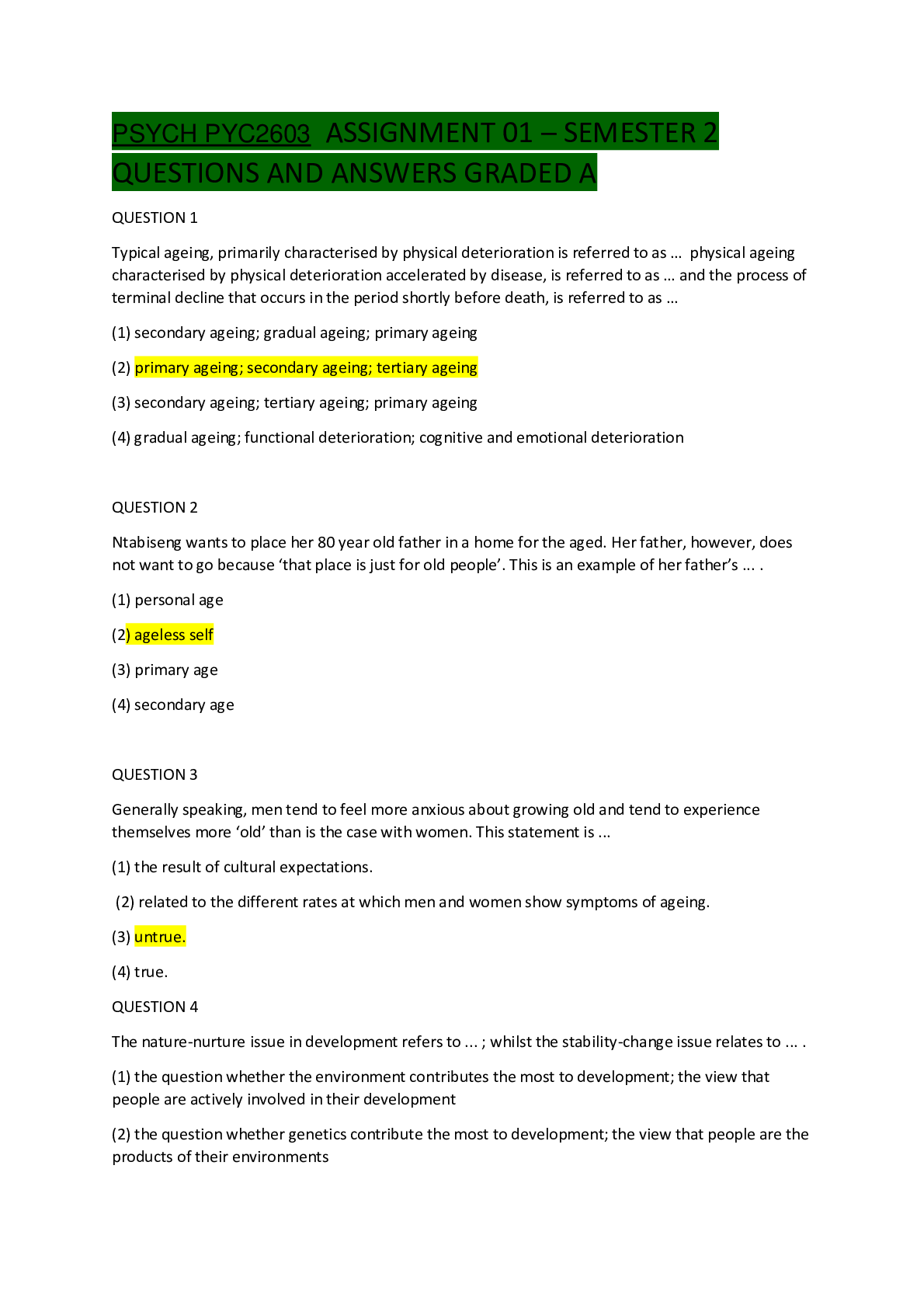
Buy this document to get the full access instantly
Instant Download Access after purchase
Add to cartInstant download
Reviews( 0 )
Document information
Connected school, study & course
About the document
Uploaded On
Dec 31, 2020
Number of pages
6
Written in
Additional information
This document has been written for:
Uploaded
Dec 31, 2020
Downloads
0
Views
90

